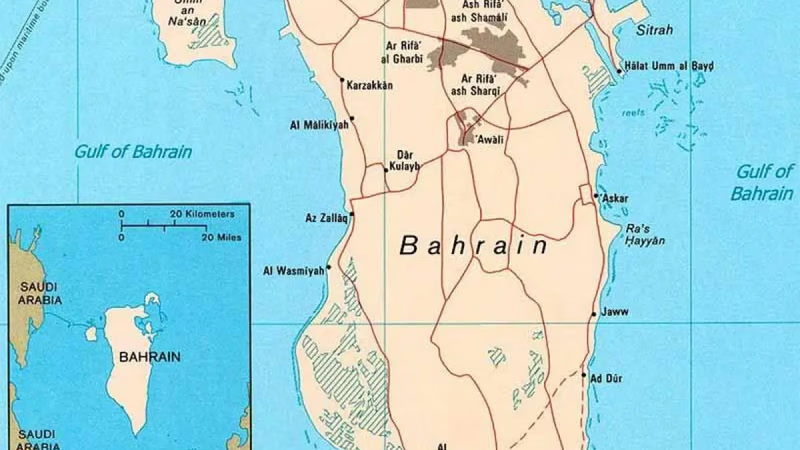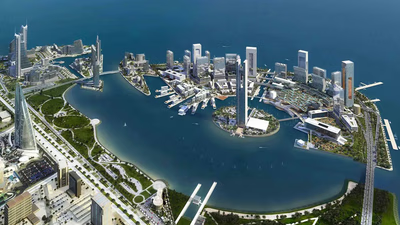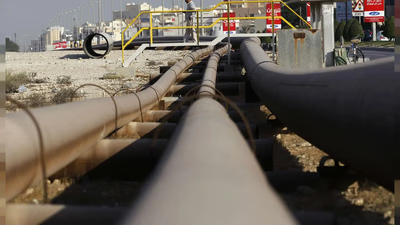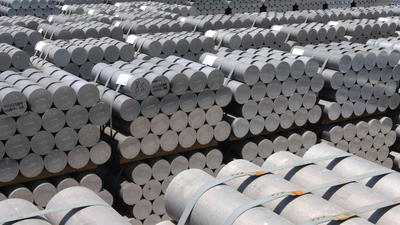
Discover Bahrain"s vibrant cities: Manama and Muharraq. "
The city of Mamana is the beautiful capital of Bahrain and is generally one of the most popular tourist destinations for travelers. This city is the industrial point of Bahrain so that many industrial factories can be seen in the city of Manama. Manama is a good option for students and the education situation in this city is excellent. Muharraq is a large and very prestigious city in Bahrain, which is old and historical in terms of texture, the houses in this city have not been rebuilt, and it is clear that the government insists on preserving the historical texture of this city.
Al-Riffa in Bahrain is one of the least valued cities, but it is on the list of excellent cities. The city is generally divided into three distinct contexts; the history sections are great for history lovers and those who are interested in the mountainous atmosphere can visit the northern parts of the city. Aali is a university city in Bahrain where many private universities have been established, it has limited working space and it is generally very beautiful and special in terms of scenic space. This city is a good option for the youth. The city of Sitra is one of the largest economic cities in Bahrain, which has a high turnover and is famous in the world.
The city of Hamad is one of the most spectacular cities in Bahrain and in general it has very strong tourism approaches, this city has a very high economic potential in terms of tourism and is also supported by the government. The city of Isa is an indigenous city in Bahrain where the people who live are all Bahrainis and there are no indigenous people. The city generally has a good work environment but racism is visible. Other Bahraini cities include Al-Malikiyah, Al-Badi'a, and Al-Had.
The corporate tax rate in Bahrain is zero for foreigners, which means you do not need to pay any tax to register a company in Bahrain, the social security rate in Bahrain has been 19.00% and the social security rate to participate in the country is about 13.00 percent, as evidence shows that the social security rate for employees in Bahrain is announced at 7.00 percent. The sales tax rate in Bahrain is more than 5.00% and it is clear that the current values of the company registration in Bahrain have been accurately assessed.
Most Iranian companies in Bahrain operate in the field of services and clothing; in general, trade-in Bahrain is growing well. The number of immigrants who have chosen to live in Bahrain is 22% more than in the past few years, and according to the economic calendar, the country has been able to obtain accurate economic statistics, and in 2020 the financial data situation in this country will improve. It will be good. The situation of Bahrain in terms of registering a company in the service space can be better for young people aged 22 to 40 than other groups. It is clear that Iranian companies have grown well in Bahrain, and it is clear that the sales and personal income situation in this country have also improved compared to other countries.
-

Bahrain, strategically located near Iran, Saudi Arabia, and Qatar, is an archipelago with a rich cultural and economic landscape. The capital city, Manama, serves as a hub for trade and tourism. The economy has transitioned from traditional pearl diving to a robust petroleum export sector, contributing significantly to government revenue. Bahrain"s climate is characterized by hot summers and mild winters, influencing its lifestyle and economic activities. The country has a diverse population of approximately 1. 5 million people who predominantly speak Arabic and practice Islam. Cultural practices are deeply rooted in Islamic traditions, with specific customs observed during Ramadan. Bahrain"s legal framework reflects its religious values, with strict laws governing respect for the flag and religious customs.
Understanding these cultural nuances is essential for businesses engaging in trade within the region. As Bahrain continues to develop as a B2B marketplace in West Asia, it offers opportunities for verified exporters and importers to connect through regional product listings and supply chain solutions.
-

Bahrain"s strategic location in the Persian Gulf positions it as a vital trade hub connecting the Middle East, Asia, and Europe. It serves as a gateway for trade among Gulf Cooperation Council (GCC) countries and beyond. The nation has developed into a prominent financial center, hosting the Bahrain Financial Harbour, which attracts numerous international banks and investment firms. Despite facing economic challenges such as fiscal sustainability and unemployment, Bahrain"s government is implementing reforms to attract foreign investment. The country"s GDP growth rate is approximately -2. 49%, with significant contributions from agriculture, construction, and mining sectors. Bahrain"s trade balance shows a deficit of -320. 30 million dinars, yet it maintains a strong import-export ranking of over 80%.
The economy is diversifying beyond oil and gas, focusing on sectors like financial services, logistics, tourism, and manufacturing under its Economic Vision 2030 initiative. Infrastructure investments have enhanced logistics capabilities with a modern seaport and an international airport serving as key air cargo hubs. Bahrain"s liberal trade policies and membership in the WTO facilitate international trade relations. "
-

Bahrain"s economy has evolved from its traditional reliance on pearls to a diversified structure with significant contributions from tourism, petroleum, and aluminum production. The country exports 60% of its petroleum products, which constitute about 30% of its GDP. Recent growth in trade and services has reached 64%, while the construction sector contributes approximately 17%. Bahrain is recognized for its aluminum production, ranking first in the Middle East and fifth globally. The agricultural sector has also seen a modest increase of 6%. Despite limited oil and gas resources, Bahrain"s financial landscape is robust, with a capital turnover growth of 96% and a current account balance exceeding 12%. The inflation rate remains low at 0. 20%, indicating economic stability.
Bahrain"s trade processes align with modern standards, facilitating imports primarily from Japan and exports to Saudi Arabia and the United States. The country’s cultural practices, including those during Ramadan, reflect its Islamic heritage while contributing to the tourism sector"s growth. Overall, Bahrain demonstrates a strong capacity for economic development through diversification and modernization.
-

Bahrain"s capital, Manama, serves as a key industrial hub and a popular tourist destination. The city boasts excellent educational facilities, making it attractive for students. Muharraq is notable for its historical architecture, preserved by government efforts. Al-Riffa offers diverse experiences with its historical sections and mountainous areas. Aali is recognized for its private universities and scenic beauty, appealing to the youth. Sitra stands out as a major economic center with significant global recognition. Hamad is known for its tourism potential, supported by government initiatives. Isa is characterized by its indigenous population and a unique work environment, despite some social challenges.
Other cities like Al-Malikiyah, Al-Badi"a, and Al-Had contribute to Bahrain"s diverse urban landscape. The corporate tax rate in Bahrain is zero for foreign investors, enhancing the business environment. The social security rates are competitive, and the sales tax exceeds 5%. Trade in Bahrain is thriving, particularly among Iranian companies in services and clothing sectors. Recent immigration trends indicate a 22% increase in residents choosing Bahrain as their home, reflecting the country"s improving economic conditions.
-

Bahrain has made significant strides in its export sector, particularly in aluminum foil production, leveraging organic raw materials. The country"s educational advancements in medicine and laboratory materials have contributed to its economic growth. Enhanced security measures have improved the living conditions for expatriates, fostering a stable environment for business. Urban transportation has also seen improvements, with consistent ticket pricing and increased safety measures. Despite a 20% decrease in re-exports during the second quarter of 2020, Bahrain remains a key player in regional trade, with Saudi Arabia, the UAE, and China being major partners. The trade balance showed slight improvement with a deficit of BD485 million. Key exports include mineral fuels, machinery, electrical equipment, and various consumer goods. Iran is a notable trading partner for Bahrain, exporting items like flooring and sweets.
However, challenges such as currency return issues and raw material supply persist for exporters. Overall, Bahrain"s strategic location and investment in infrastructure position it as an essential hub for trade in the Middle East.





